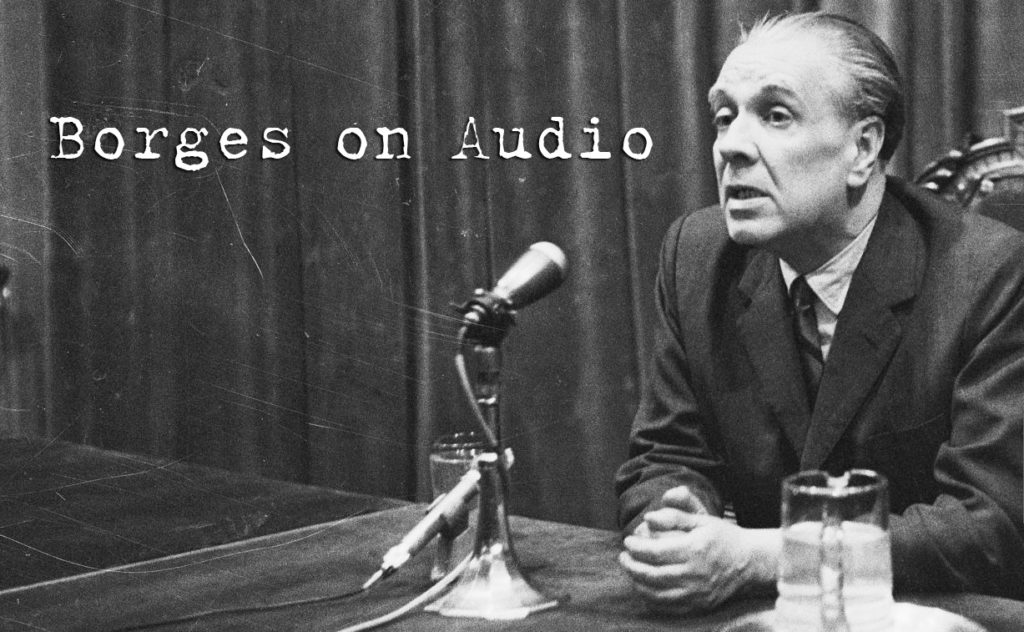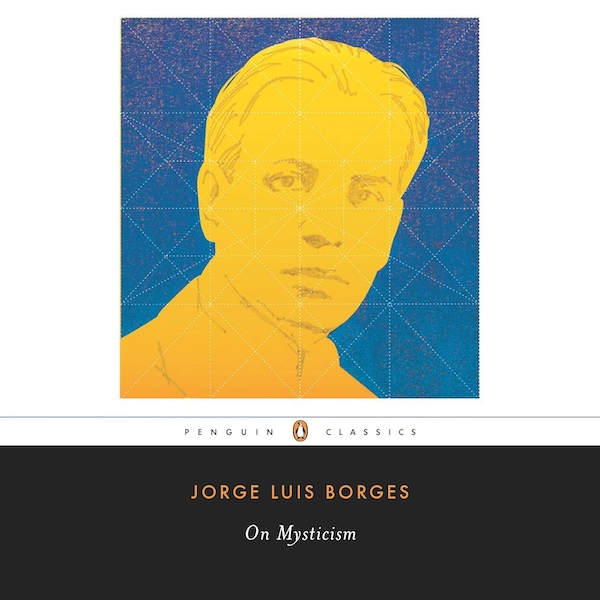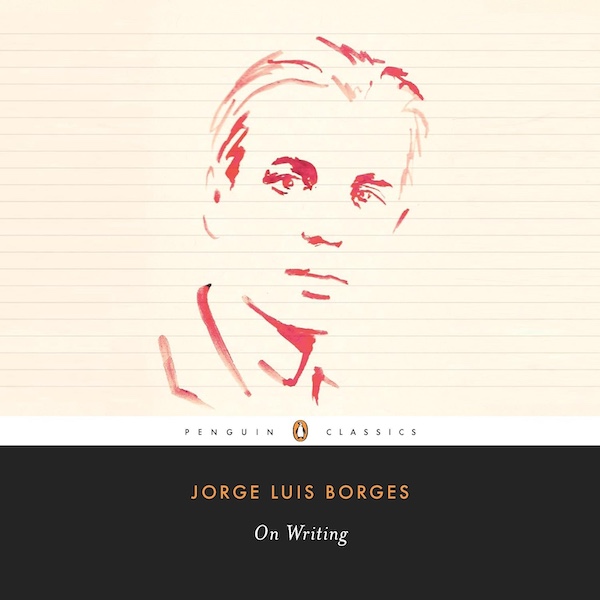Borges Audio – Audiobooks
- At August 30, 2024
- By Great Quail
- In Borges
 0
0
Borges Audio: Audiobooks
This section profiles Borges on audiobook, from old-school “books on tape” to compact discs and digital aax files. For it to qualify, it must be audio only, and feature more than a single story. YouTube videos that narrate single stories are located on their own section. The reviews and commentary on this page focus on the history, presentation, and narration of each audiobook, not the contents of the work itself. The audiobooks are listed in chronological order of recording date:
The Aleph and Other Stories (1972)
Collected Fictions (Abridged) (1999)
Ficciones (2016–2024)
Labyrinths (2019)
Collected Fictions (Unabridged) (2023)
A Universal History of Iniquity (2023)
The Aleph and Other Stories (2023)
Brodie’s Report (2023)
Book of Sand and Shakespeare’s Memory (2023)
Selected Poems (2023)
Poems of the Night (2023)
The Sonnets (2023)
Selected Non-Fictions (2023)
On Argentina (2023)
On Mysticism (2023)
On Writing (2023)
Most offsite links take you to Amazon. From there you can browse reviews, listen to a 5-minute sample of the book, and purchase the “aax” file for your Audible-enabled device. You can also go directly to Audible by following the appropriate links. (Amazon owns Audible.)
The Aleph and Other Stories
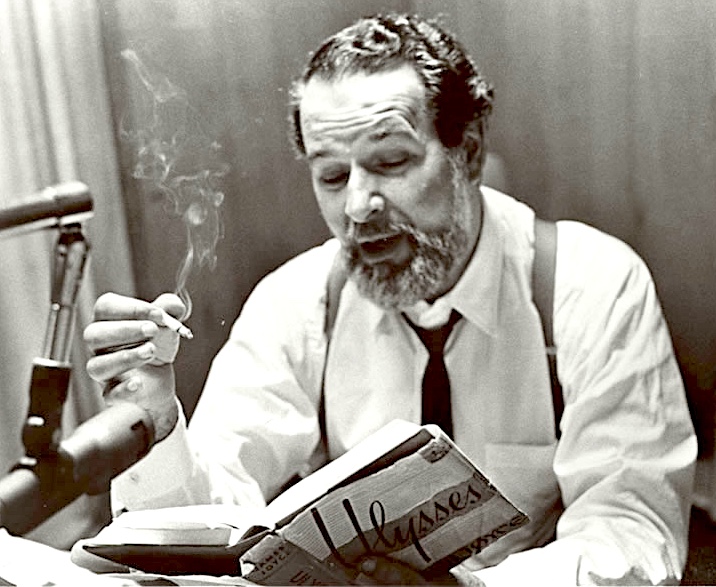
Read by Alexander Scourby
American Foundation for the Blind, 1972
“Talking Book” Cartridges
Unabridged; 10 hours, 36 minutes
Listen at: The Garden of Forking Paths
This early recording of a Borges “book on tape” has its genesis in a little-known Congressional act. According to the National Federation of the Blind:
In 1931 Congress passed the Pratt-Smoot Act, which authorized the distribution of books to blind and physically handicapped people in the United States through what is now known as the National Library Service for the Blind and Physically Handicapped of the Library of Congress (NLS). “Talking Books” began to be produced in 1934 and were originally recorded on phonograph records; cassette books were produced beginning in 1971. Today recorded books and the equipment to play them are distributed through a network of cooperating libraries throughout the country. Books on all subjects and representing all literary genres, as well as a selection of popular magazines, are available to NLS patrons.
One of the biggest producers of “talking books” was the American Foundation for the Blind, who hired professional actors to record unabridged readings on LP, then on 1/4 magnetic tape. The Aleph and Other Stories was read by Alexander Scourby, an American actor who had become famous for his recordings of the King James Bible, Tolstoy’s War and Peace, and Joyce’s Ulysses. Scourby brings a wonderfully resonant voice to Borges, and his dramatic readings of these stories have the theatrical appeal of a bygone radio show.
Collected Fictions (Abridged)

Collected Fictions
Translated by Andrew Hurley
Read by George Guidall. Produced & abridged by John McElroy
Penguin Audio, 1999
Abridged; 5 hours, 14 minutes
Also available as: Cassette | CD | Audible
In 1998 Viking/Penguin celebrated the imminent “Borges Centennial” by publishing Collected Fictions, a massive compilation of Borges’ short stories newly translated by Andrew Hurley. Because audiobooks were still largely “books on tape” delivered on cassette, Penguin released an abridged audio version that contained 17 selected stories and prose pieces. They were read by American voice-actor George Guidall, an award-winning stalwart of the burgeoning audiobook industry. He reads the stories with engagement and conviction, his refined Transatlantic accent recalling a lost world of fireside radio. (George Guidall is also the narrator of the Gravity’s Rainbow audiobook.) The Collected Fictions audiobook contains the following stories:
• Man on Pink Corner
• The Lottery in Babylon
• The Garden of Forking Paths
• Death and the Compass
• The Aleph
• The Maker
• Dreamtigers
• Parable of Cervantes and the Quixote
• The Story of Rosendo Juarez
• Borges and I
• The Zahir
• August 25, 1983
• Shakespeare’s Memory
• The Circular Ruins
• The Library of Babel
• The Immortal
• The Encounter
Robert Rodriguez offered this commentary to the Garden in 2001:
Guidall is a consummately intelligent reader, his skill and voice aptly suited to the precise yet abstract quality of Borges’ fiction. Guidall does not condescend to contrived accents or dramatizations. His expression and intonation strike the perfect note. Hence, the tense inscrutability of the Chinese narrator in “The Garden of Forking Paths,” the guttural German of “Death and the Compass,” the arrogant civility of Argentinos in “The Aleph,” and the quiet consternation of the narrator in “The Aleph,” “The Zahir,” “Shakespeare’s Memory” and “Borges and I.” All the favorites are here, though I wonder how an Irish accent in “Shape of the Sword” or the Arabic of “The Mirror of Ink” would read with Guidall. Only in “Man on Pink Corner” does Guidall use a street-wise Spanish accent, which, however, accords perfectly with this “realistic” story.
NOTE: In “Borges and I,” Guidall reads “seventeenth” century typefaces, not Hurley’s “eighteenth.” My original (Obras completas, Emecé, 1974) clears says “siglo XVIII.”
Additional Information
In 2023, Penguin released an unabridged recording of Collected Fictions with Cástulo Guerra reading. (See below.) For details about the contents of Collected Fictions, see Borges Works: Fiction.
Ficciones

Ficciones
Translated by Anthony Kerrigan
Read by Joseph Voelbel
Listen at: YouTube
Joseph Voelbel is an American YouTube artist who has produced a complete and unabridged recording of Ficciones. According to his YouTube abstract, his project represents:
A gnostic concatenation of neo-realism meets metaphor, wrapped in a letter, composed between ellipses of a 1,001 nights, a product of Babylon, of the Company, a lost encyclopedia of Tlön reflected in a looking glass, the Schopenhauer in all of us, that every man was Shakespeare, a splash of Kafka, the mathematical precision of a footnote, the journey out of a labyrinth by always going left, an Oxford man, the cult of the Phoenix (or more accurately the secret), the four letter name for God, the obverse side of a twenty centavo coin, a Greek Diana, a learned Librarian, that Garden of Forking Paths, which journeyed to the center of the soul, the metaphysical and everyday implications of memory—Memorious, Imagination, the journey to see the seer, the space inside a hidden chest at the bottom of a bottomless sea, the educated man, the belief that Don Quixote was the author of Cervantes. The Odyssey in the form of a book report of James Joyce’s Ulysses.
His readings are accessible, unpretentious, and delivered with a minimum of fuss.
Additional Information
For details about the contents of Ficciones, see Borges Works: Fiction.
Labyrinths

Labyrinths
Translated and edited by Donald A. Yates & James E. Irby
Read by Dominic Keating
New Directions, 2019
Unabridged; 10 hours, 21 minutes
Also available at: Audible
Labyrinths is read by Dominic Keating, the British actor who played Lieutenant Malcolm Reed on Star Trek: Enterprise. He has a crisp, English accent that draws out the final word of sentences; the kind of voice one imagines narrating an H.G. Wells novel. While he occasionally misses the humor in Borges, Keating offers a serviceable and pleasantly traditional reading.
Additional Information
For details about the contents of Labyrinths, see Borges Works: Fiction.
Collected Fictions (Unabridged)

Collected Fictions
Read by Cástulo Guerra
Penguin Audio, 2023
Unbridged; 27 hours, 24 minutes
Also available at: Audible
In 2023 Penguin Audio released their complete “centennial” Borges catalogue on audiobook. Rather than reissue their 1999 abridged Collected Fictions with George Guidall, they commissioned a new, unabridged recording by Cástulo Guerra, an Argentine actor praised by IMDB for his “international flair and distinguished voice.” It was an inspired choice—77 years old when he made these recordings, it’s not difficult to imagine Guerra as a stand-in for Borges himself. (Though Guerra’s actorly delivery is more crisp and forceful than Borges’ speaking voice, and his English is perfect.) It’s especially refreshing to hear Guerra pronounce Spanish names and phrases like a native speaker—no one can rattle off “Buenos Aires” quite like an Argentine!
My only critique about this audiobook is inextricably bound to its strength—Guerra’s age. Borges’ most famous stories were written as a younger man in his 30s and 40s. There’s a difference between hearing “Tlön, Uqbar, Orbis Tertius” and “The Aleph” narrated by a middle-aged man and one nearing his eighties; a sense of vitality and confidence is traded for a tone of professorial reflection. Still, this is only a quibble, and Guerra has achieved something remarkable—27 hours of Borges read with empathy, humor, and understanding. An essential use of an Audible credit!
Reviews: While AudioFile reviews are usually fluffy blurbs intended to keep the logs rolling, their appraisal of Collected Fictions is spot-on:
Narrator Cástulo Guerra…finds in these stories considerable depths of emotion and humanity, and delivers them to listeners. The world of Borges’s fiction is varied and strange, drawing on science fiction, folklore, philosophy, and more, but immersing oneself in this audiobook makes many of the themes and connections clear. Guerra’s English is excellent, with just enough of an Argentine accent to remind listeners where most of the stories are set. A detailed knowledge of Latin American history would be rewarded but is not necessary; an openness to new ways of seeing the world is more useful.
Additional Information
This audiobook is sometimes listed as “Collected Fictions, Volume 1,” a confusing and potentially misleading title. The “volume” here refers to the three “volumes” of the “centennial Borges editions” released by Viking in 1998–1999. “Volume 1” is Collected Fictions, “Volume 2” is Selected Poems, and “Volume 3” is Selected Non-Fictions. Each audiobook contains the entire unabridged contents of its corresponding collection. For details about the contents of Collected Fictions, see Borges Works: Fiction.
A Universal History of Iniquity
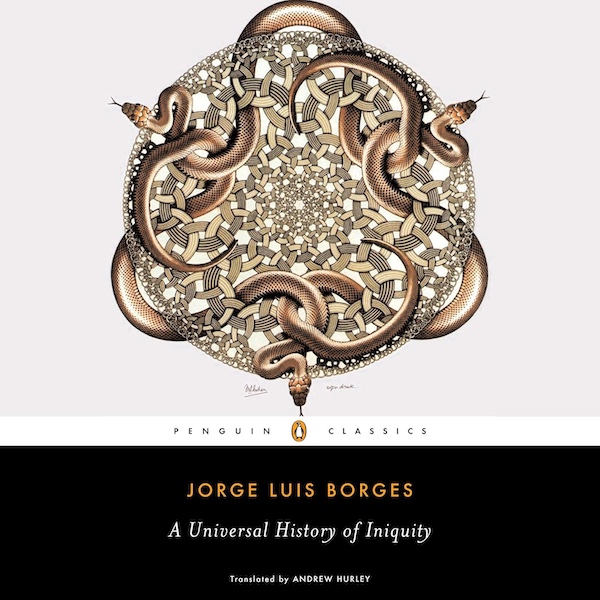
A Universal History of Iniquity
Read by Cástulo Guerra
Penguin Audio, 2023
Unabridged; 3 hours, 54 minutes
Also available at: Audible
Viking’s 1998 Andrew Hurley translation of Historia universal de la infamia read by Argentine actor Cástulo Guerra. (Reviewed above.) Because all of these stories are included in Collected Fictions, interested visitors are advised to purchase Penguin’s Collection Fictions instead. For details about the contents of A Universal History of Iniquity, see Borges Works: Fiction.
The Aleph and Other Stories
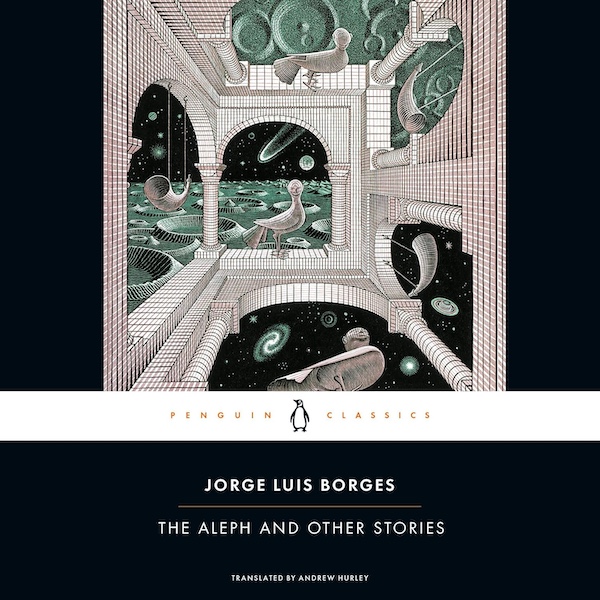
The Aleph and Other Stories
Read by Cástulo Guerra
Penguin Audio, 2023
Unabridged; 8 hours, 38 minutes
Also available at: Audible
Viking’s 1998 Andrew Hurley translation of stories from El Aleph and El hacedor read by Argentine actor Cástulo Guerra. (Reviewed above.) Because all of these stories are included in Collected Fictions, interested visitors are advised to purchase Penguin’s Collection Fictions instead. For details about the contents of The Aleph and Other Stories, see Borges Works: Fiction.
Brodie’s Report
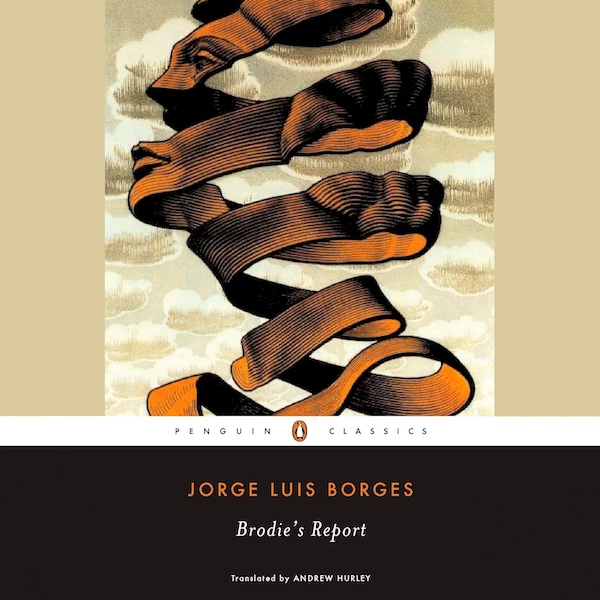
Brodie’s Report
Read by Cástulo Guerra
Penguin Audio, 2023
Unabridged; 4 hours, 55 minutes
Also available at: Audible
Viking’s 1998 Andrew Hurley translation of El informe de Brodie read by Argentine actor Cástulo Guerra. (Reviewed above.) Because all of these stories are included in Collected Fictions, interested visitors are advised to purchase Penguin’s Collection Fictions instead. For details about the contents of Brodie’s Report, see Borges Works: Fiction.
The Book of Sand and Shakespeare’s Memory
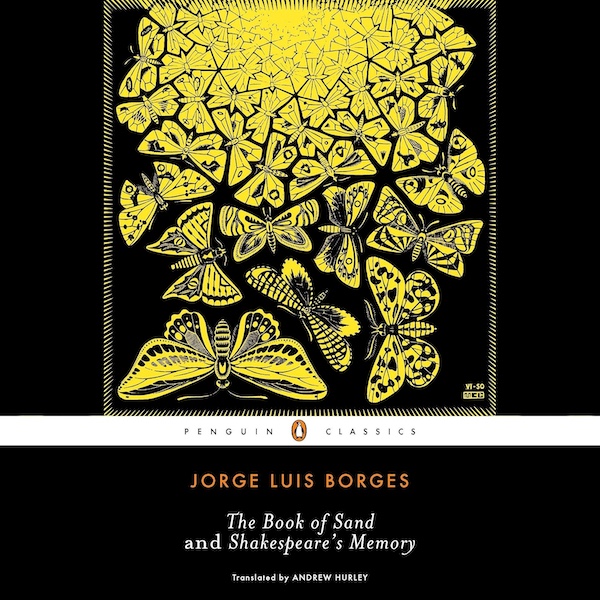
The Book of Sand and Shakespeare’s Memory
Read by Cástulo Guerra
Penguin Audio, 2023
Unabridged; 6 hours, 26 minutes
Also available at: Audible
Viking’s 1998 Andrew Hurley translation of El libro de arena read by Argentine actor Cástulo Guerra. (Reviewed above.) Because all of these stories are included in Collected Fictions, interested visitors are advised to purchase Penguin’s Collection Fictions instead. For details about the contents of Book of Sand, see Borges Works: Fiction.
Selected Poems
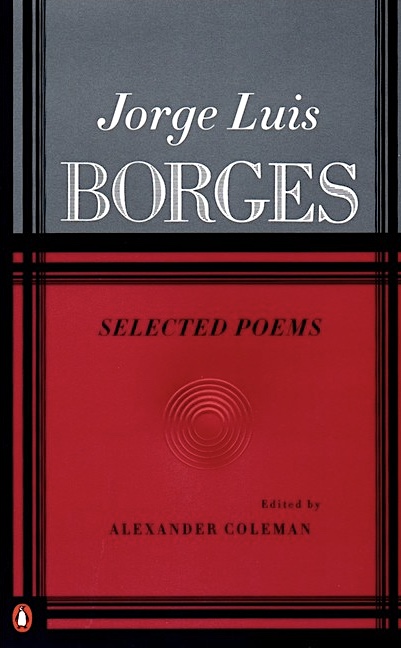
Selected Poems
Read by Juanita Devis
Penguin Audio, 2023
Unabridged; 14 hours, 19 minutes
Also available at: Audible
In 2023 Penguin Audio released their complete “centennial” Borges catalogue on audiobook. The 1999 Viking Selected Poems was assigned to the Colombian actress Juanita Devis. Following the “parallel” presentation of the book itself, the poems are read in Spanish and English.
Devis has a clear voice with warm, alto intonations. Her Spanish is crisp and Latin-American neutral, easily understood by even a novice speaker; bur her readings lack depth and musicality. There’s a “sameness” to her delivery that fails to capture the evolving moods of Borges’ poetic oeuvre, from the enthusiastic “fervors” of his early poems to the bemusement and resignation of his latter works. Worse still is her apparent lack of familiarity with Borges. She takes the poems somewhat slowly, with the hesitant pauses of someone approaching a reading for the first time, and her phrasings and coloration feel like a tentative “first draft.” Certain obvious words are emphasized—“love,” “shadows,” “death”—but one gets the impression that’s because such words are recognized as having inherent dramatic value; not because they emerge as focal points in an organic narrative. Meanwhile, more subtle load-bearing verses are dispatched with little nuance or care. In short, these poems do not feel cherished, lived-in, breathed by the reader. “Amorosa anticipación” is voiced without intimacy or tenderness, “Ragnarök” is declaimed like an essay devoid of mystery or meaning, and “My Last Tiger” is unpacked as discrete impressions that never coalesce into a greater whole.
Devis’ curious insensitivity to subject and mood also impacts her reading of Borges’ more academic poems, those revolving around other writers, esoteric philosophies, or arcane topics such as Anglo-Saxon history and verse. She approaches Borges’ myriad allusions like a shopping list. There’s no feeling of recognition, reverence, or awe; names like Descartes, Chesterton, and Cervantes are just random syllables on the page. There’s no invocation in “Invocación a Joyce,” no “furious squalls” and “abomination” in “Herman Melville.” In fact, she mispronounces “Leviathan” and “Pequod,” clear signs of poor preparation and inattentive editing. Furthermore, Devis’ English is marked by a very strong accent. While this might be a selling point for English translations of a Latin American writer, her English readings are fractured by jarring decisions in cadence and enunciation, and lack the warmth she brings to the Spanish originals. Considering the high regard Borges had for the English language, why not have the English translations read by someone more fluent in the language? There’s no reason that parallel texts can’t have parallel readers.
Which brings us to the question of—why this particular reader? I understand the decision to select a Latin American reader, but why a Colombian woman instead of an Argentine man? While few listeners may care about the gender (or age) of a reader if the work is nonfiction, some fiction and poetry is written from a personal or gendered perspective. There’s certainly some value to deliberately swapping genders, and many of Borges’ poems are fairly neutral. But Devis’ readings of poems such as “Borges y yo” (“Borges and I”), “Poema conjetural” (“Conjectural Poem”) and “El remordimiento” (“Remorse”) feel strangely removed, the thoughts of an old man ventriloquized through the voice of a younger woman. Again, such a transposition may have value in itself, but it’s not like Selected Poems is entering a market crowded with options. If you want to hear English translations of Borges’ poems on audiobook, this is your only real choice! I can’t imagine Penguin would tap Ryan Gosling to read the collected poems of Maya Angelou; so why not find a reader more suitable for the material here?
Or—why stick to a single reader at all? There’s the dual-language approach mentioned above, but why stop there? Considering the works in Selected Poems were translated by different people, why not enlist multiple readers? I could imagine younger readers investing Borges’ ultraísmo poems with youthful exuberance, while more dramatic readers could approach the prose-poems of El hacedor as miniature ficciones. And of course, Borges’ latter verses of nostalgia, dissolution, and erasure would benefit from the gravitas of old age: imagine “Two Forms of Insomnia” read by Judi Dench! This version of Selected Poems would have been more expensive to record and produce; but it would have been an instant classic, breathing new life into an already under-appreciated genre.
While I appreciate Penguin’s effort to finally realize these poems on audiobook, Selected Poems feels like an afterthought, a generation-late misfire made by a company more concerned with tapping a new revenue stream than creating something beautiful.
Additional Information
This audiobook is sometimes listed as “Selected Poems, Volume 2,” a confusing and potentially misleading title. The “volume” here refers to the three “volumes” of the “centennial Borges editions” released by Viking in 1998–1999. “Volume 1” is Collected Fictions, “Volume 2” is Selected Poems, and “Volume 3” is Selected Non-Fictions. Each audiobook contains the entire unabridged contents of its corresponding collection. (In other words, there is no “Selected Poems, Volume 1.”) For details about the contents of Selected Poems, see Borges Works: Poetry Compilations.
Poems of the Night
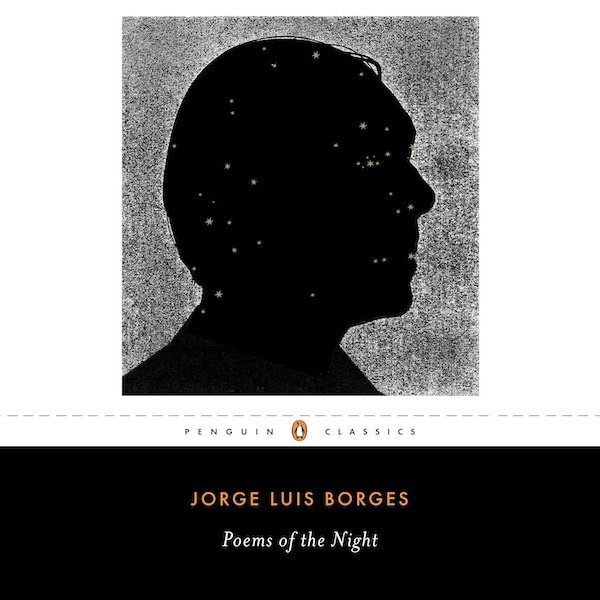
Poems of the Night
Read by Juanita Devis
Penguin Audio, 2023
Unabridged; 4 hours, 45 minutes
Also available at: Audible
Of the sixty-odd pieces in Poems of the Night, over half of them were culled from Viking’s Selected Poems; the rest are new translations or works that failed to make the original cut. The poems are read by Colombian actress Juanita Devis, who reads them in both Spanish and English. (See Selected Poems above for commentary on Devis’ reading.)
Additional Information
For details about the contents of Poems of the Night, see Borges Works: Poetry Compilations.
The Sonnets
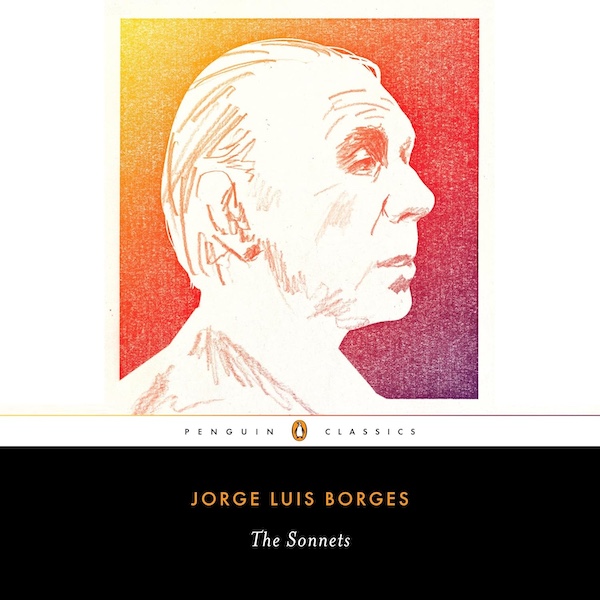
The Sonnets
Read by Juanita Devis
Penguin Audio, 2023
Unabridged; 5 hours, 54 minutes
Also available at: Audible
The Sonnets collects Borges’ complete sonnets, many of which were culled from Viking’s Selected Poems. They are read by Colombian actress Juanita Devis, who reads them in both Spanish and English. (See Selected Poems above for commentary on Devis’ reading.)
Additional Information
For details about the contents of The Sonnets, see Borges Works: Poetry Compilations.
Selected Non-Fictions
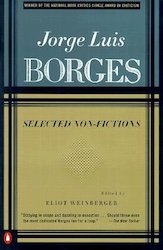
Selected Non-Fictions
Translated by Andrew Hurley
Read by Diego Diment
Penguin Audio, 2023
Unabridged; 25 hours, 49 minutes
Also available at: Audible
In 2023 Penguin Audio released their complete “centennial” Borges catalogue on audiobook. The 1999 Viking Selected Non-Fictions was assigned to Diego Diment, an Argentine voice-over artist based in Oregon. He reads the essays in a soothing, measured voice contoured by a distinct Latin accent. Unfortunately, Diment rarely varies his intonation, and he frequently slips into the denuded monotone of an AI. This impression is reinforced by his idiosyncratic pronunciations of non-Spanish names. I applaud Penguin for employing an Argentine actor to read Borges, but this is Borges—learn how to pronounce Kafka! And I want to be clear, I’m not complaining about Diment’s accent, which is quite lovely. It’s his inattention to Borges’ cosmopolitan allusions that proves alarming. It raises the uncomfortable question—does the reader actually know what these references mean? Or, are they just empty words on the page?
This feeling that maybe the reader isn’t understanding the subject is reinforced by Diment’s robotic delivery—it’s hard to get through even one essay, let alone 26 hours of them! His voice is so hypnotically monotonous one quickly loses track of what each essay is saying. There’s little expression of the myriad forms of wonder, curiosity, and amusement found in Borges. For instance, right after reading “This is the mysterious and tranquil paragraph I marked,” Diment mechanically unspools said paragraph in the exact same manner as everything else in the essay (“Kafka and His Precursors”). It’s like someone programmed an old-school Macintosh speech synthesizer to process 500 pages of philosophy: The Talking Moose reads Schopenhauer.
My sad conclusion is this: just like Selected Poems, Penguin’s audiobook of Selected Non-Fictions is another failed opportunity, one made even more lamentable by Penguin’s ironclad hold on translation copyright. As wonderful as they are, these “Borges centennial volumes” have stood for over a quarter of a century, deliberately edging out earlier translations and blocking the road for anything new. It’s great that Penguin finally decided to produce them as audiobooks, but the only volume worth hearing is Cástulo Guerra’s excellent Collected Fictions. So this is what we’re stuck with for the foreseeable future: naive and amateurish readings of his poetry, and mechanical recitations of his essays. And given that the five “spin-offs” of Selected Poems and Selected Non-Fictions contain little new material and feature the same disinterested narrators, one wonders what value Borges holds for the modern Penguin/Random House? Has he become just an esoteric cash cow, milked occasionally to maintain literary credentials?
Additional Information
This audiobook is sometimes listed as “Selected Non-Fictions, Volume 3,” a confusing and potentially misleading title. The “volume” here refers to the three “volumes” of the “centennial Borges editions” released by Viking in 1998–1999. “Volume 1” is Collected Fictions, “Volume 2” is Selected Poems, and “Volume 3” is Selected Non-Fictions. Each audiobook contains the entire unabridged contents of its corresponding collection. For details about the contents of Selected Non-Fictions, see Borges Works: Nonfiction.
On Argentina
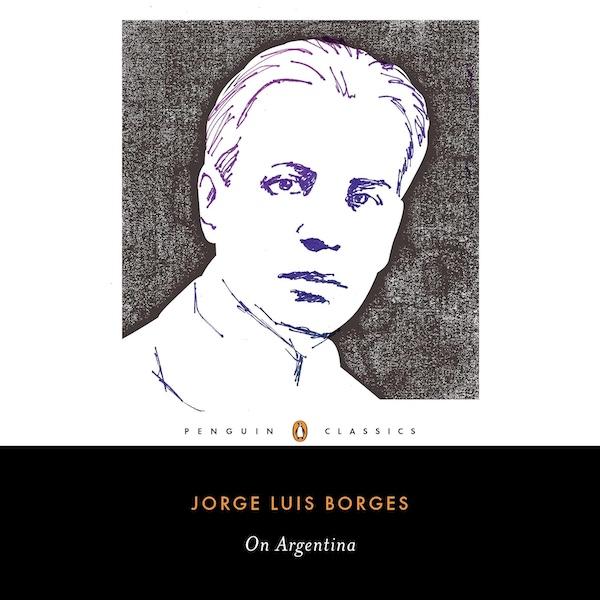
On Argentina
Read by Diego Diment
Penguin Audio, 2023
Unabridged; 5 hours, 26 minutes
Also available at: Audible
Of Penguin’s three 2010 Borges compilations, On Argentina contains the most previously-untranslated pieces. The book is read by Argentine-American voice-over artist Diego Diment. (See Selected Non-Fictions above for commentary on Diment’s reading.)
Additional Information
For details about the contents of On Argentina, see Borges Works: Nonfiction.
On Mysticism
On Mysticism
Read by Diego Diment
Penguin Audio, 2023
Unabridged; 4 hours, 24 minutes
Also available at: Audible
A grab-bag of essays, poetry, and prose, most of the pieces compiled in On Mysticism originally appeared in Viking’s Collected Fictions, Selected Poems, and Selected Non-Fictions; only five are new translations. The book is read by Argentine-American voice-over artist Diego Diment. (See Selected Non-Fictions above for commentary on Diment’s reading.)
Additional Information
For details about the contents of On Mysticism, see Borges Works: Nonfiction.
On Writing
On Writing
Read by Diego Diment
Penguin Audio, 2023
Unabridged; 5 hours, 51 minutes
Also available at: Audible
Of the thirty-eight pieces compiled in On Writing, twenty-eight were drawn from Viking’s Selected Non-Fictions; the rest are new translations or works that failed to make the original cut. The book is read by Argentine-American voice-over artist Diego Diment. (See Selected Non-Fictions above for commentary on Diment’s reading.)
Additional Information
For details about the contents of On Writing, see Borges Works: Nonfiction.
Borges on Audio
Main Page — Return to the “Borges on Audio” main page and index.
Borges in His Own Voice — Poems, stories, and lectures read by Borges himself.
YouTube Readings — Readings of Borges set to music, video, or animations and placed online.
Commentary — Audiobooks and online readings about Borges, or that make extensive mention of Borges.
Author: Allen B. Ruch
Last Modified: 30 August 2024
Main Borges Page: The Garden of Forking Paths
Contact: quail(at)shipwrecklibrary(dot)com

